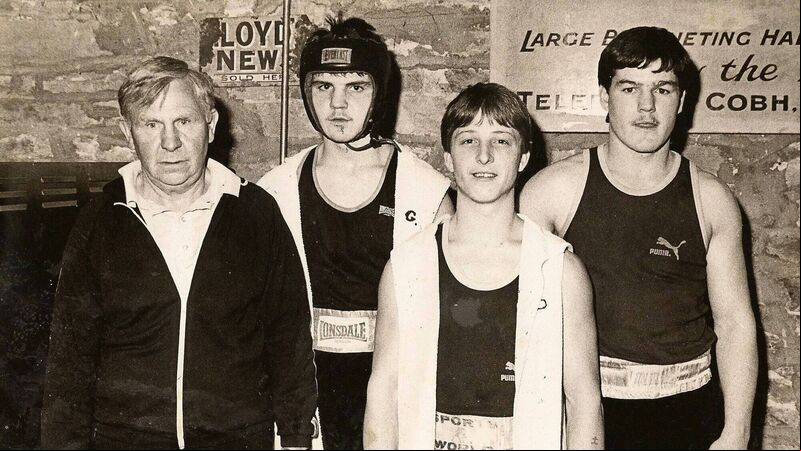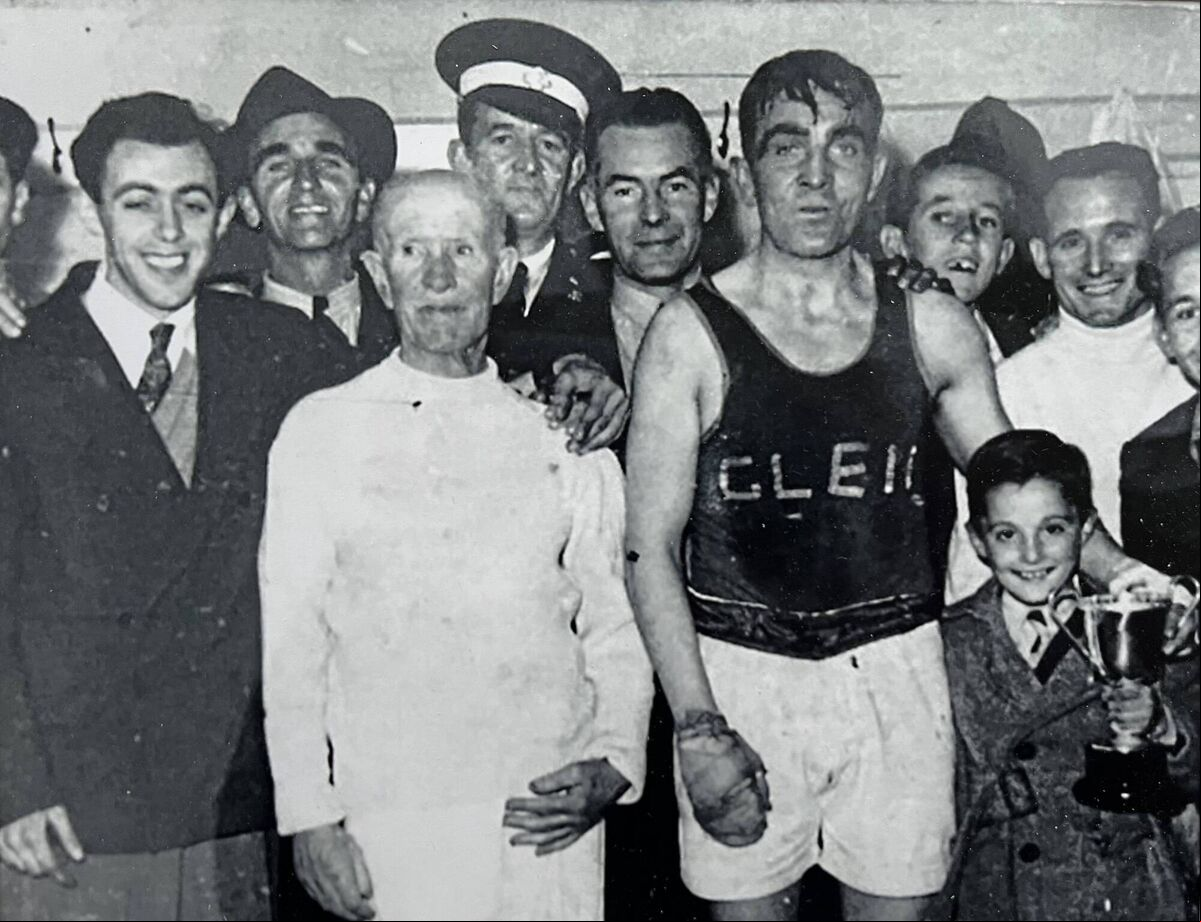Cork people have always had a love for boxing, both at local and national level

Coach Albie Murphy pictured with a trio of Sunnyside Internationals and greats of Irish Boxing, Gordon Joyce, Paul Buttimer and Kieran Joyce. In 1987 all three won National Senior titles on the same night at the National Stadium in Dublin.
Recently, Cork TD Ken O’Flynn, accompanied by his father, Cllr Noel O’Flynn and some guests enjoyed a very relaxed visit to the Tomas MacCurtin Boxing Museum located in the Glen Boxing Club.
The TD suggested Cork people are very interested in the story of Cork boxing, and the following is a brief summary of the sport on Leeside.
Since the opening of the new Cork City Hall in 1936, boxing has always featured in this iconic building, renowned for its elegance and beautiful stonework.
It has always been the mecca of Cork boxing.
Despite occasional peaks and valleys over the years, the sport has always had widespread appeal.

Leeside boxing has produced some great clubs, who in turn have turned out great champions generation after generation.
Around 1900, boxing had strongholds in Blackpool, Mallow, Bandon and Cobh.
The household names of that era included Jimmy Browne, Jack Stout, Tommy Doyle, and Napper McGrath.
The boxing landscape changed again in 1912 with the arrival of Pakey O’Mahony and Legsy O’Sullivan.
Both went on to become heavyweight champions of Ireland.
Pakey went on to fight for the British title, but was beaten by Billy Wells after a very plucky display.
His performance was ired and acknowledged by the people of Cork, who presented him with a very expensive silver belt, replicating the British title belt.
In 1911, the Irish Amateur Boxing Association was founded.
Three years later, the Cork County Boxing Board was established and when the Glen Boxing Club was set up in 1916, few knew then that it would go on to become an institution in Irish boxing folklore, and proudly stands today as Ireland’s oldest club.
The club quickly located a small terraced house in Spring Lane, provided free through the generosity of the local Goulding Fertilizer Company. Glen Rover Hurling Club was formed in the Boxing Club and held all their meetings there for the first five years.
The boxing club remained there until 1966.
Amateur boxing ebbed and flowed in the 1920s, with clubs coming and going.
The standout name was of course, Willie ‘Boy’ Murphy, who boxed with the army and the Garda club, and represented Ireland at the Olympics in Paris and Amsterdam.
In 1927, Sunnyside BC was founded, and went on to become Cork’s most successful club.
Boxing continued to flourish in the ‘30s, and Femoy Boxing Club became great stalwarts of the sport, and provided many s as well. Mallow was also blooming, and that club went on to produce the Buckley brothers, who were revered throughout the country.
Ireland became the envy of the boxing world when the IABA opened the first-purpose built boxing stadium in 1939 to host the European Championships.
The sport was very popular in the ‘40s, with huge tournaments taking place in City Hall.

There was many a night when the crowd outside the door who failed to gain ission was as big as the full house inside.
In 1946 and 1947, two senior titles came to Cork.
Jimmy ‘Gunner’ Murray brought glory to the Glen, and the great Tommy Hyde put Sunnyside on the map.
In 1948, Tim O’Sullivan boxing out of the CCNBS Club, qualified to represent Ireland at the London Olympics, but sporting politics raised its ugly head, and Tim did not travel to the games.
The IABA subsequently acknowledged their injustice and presented Tim with a medal depicting the spirit of the Olympics.
1948 was an outstanding year for Glen boxer Ernie Keeffe.
He was on the first Irish rugby team to win the Grand Slam, and two weeks later, boxed for Ireland against England in the National Stadium.
Terry Moore was the other Irish rugby international to box with the Glen.
The 1950s saw the City Hall rock, thanks to great nights organised by John Birmingham, a man ahead of his time, who later became Lord Mayor of Cork.
He was also secretary of the Glen BC, and secretary of the Cork County Board.
One of the most memorable nights at City Hall was when Paddy Martin of the Glen beat Joe Bygraves from Jamaica.
Bygraves went on to knock out Henry Cooper, who in turn went on to drop the great Muhammad Ali… hence the name Paddy ‘The Champ’ Martin.
In 1960, Paddy Kenny of the CCNBS Club represented Ireland at the Rome Olympics, while in 1961, the first team to represent Cork defeated Dublin at the Parochial Hall to win the Inter City Cup.
This team included Finbarr O’Leary, Paddy Gough, Tony Arnold, and many other great Leeside boxers.
The 70s saw the sport go into decline, but it was re-organised through the great work of Victor Aston and Dan O’Connell.
Then, came the golden age of Cork boxing.
Albie Murphy lit up the boxing arena of Ireland, and coached great Sunnyside boxer Kieran Joyce, John Morrissey, Paul Buttimer, Neilie Dunne, Gordon Joyce, and Michael Roche to win a staggering 20 Elite National Titles.

Under his guidance, the club produced three Olympians, Kieran Joyce, Paul Buttimer and culminating with Michael Roche in Sydney in 2000, to close a glorious chapter in this brief look at a century of Cork boxing.







 App?
App?







